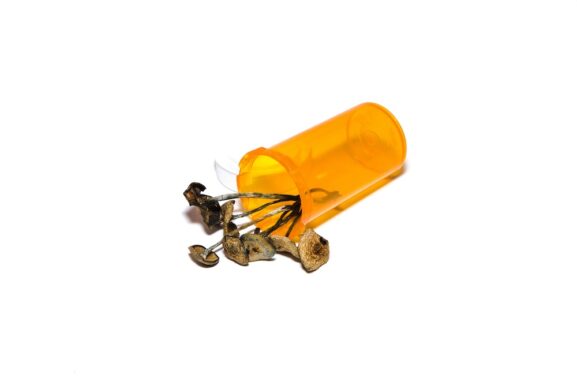Psychedelic Integration: What Does It Actually Mean, And Why Is It Important?
While psychedelic users, researchers, and therapists may disagree as to what “psychedelic integration” means exactly, we can offer a broad, two-part definition that sums its meaning. Psychedelic integration is the period after a trip — days, weeks, months, and even years — that involves (1) making sense of the experience and (2) applying its lessons to everyday life.
This guide on psychedelic integration will dive deeper into this two-part definition. It also details the importance of this stage of the psychedelic experience.
RELATED: Best Kratom Powder Of 2022
Psychedelic Integration: Sense-Making
“Making sense” of a psychedelic experience can involve a number of themes. However, each one may potentially have a long-term impact on one’s worldview and psychological well-being.
Metaphysical Outlook
You can have all kinds of intense and strange experiences while on a psychedelic. These include the following:
- Out-of-body experiences
- Meetings with entities
- Seeing nature and objects become alive
- Feeling your sense of self dissolve
- Making contact with the “divine”
- Traveling through (seemingly) different dimensions.
Depending on your pre-existing metaphysical or religious beliefs, these experiences may be difficult to make sense of.
For some, a change in metaphysical outlook can occur, such as moving away from materialism (everything is material) toward panpsychism (everything possesses some level of consciousness). Others may abandon atheism and embrace a belief in God or a higher power.
However, not every psychedelic user radically changes their metaphysical beliefs following even the most intense mystical experiences. Some may incorporate the experiences into their pre-existing worldview. Alternatively, others may remain agnostic about what they mean in terms of the nature of consciousness or reality.
Values
Psychedelic experiences can feature many heightened emotional states and related thoughts. For example, an experience may be accompanied by strong feelings of empathy and compassion, directed toward oneself and others. It is also common for individuals to confront difficult emotions during a trip, then feel better for having done so.
These experiences, as well as deeply introspective states, may throw into question what an individual’s most important values are. This aspect of sense-making may motivate someone to prioritize values such as kindness and authenticity.
The Psyche
Psychedelic experiences can include many types of visions and rememberings of past events. They may also heighten emotional states (both positive and negative).
Making sense of all these aspects may offer an individual some insight into how their mind works. This includes their personality, how their past is affecting them today, or how current habits of thought, feeling, and behavior impact their mental well-being. Many of the visions experienced may be symbolic in nature, which may reveal valuable information about the unconscious.
This dimension of sense-making may help an individual to see new possibilities — how they might be able to think, feel, and behave differently. Someone might realize that their trip revealed hidden aspects of the self, which, if integrated, would lead to mental health improvements. These hidden aspects can be both positive and negative in nature.
RELATED: Why It’s Important To Set An Intention For Your Psychedelic Journey — And How To Do It
Psychedelic Integration: Applying The Lessons
Applying the lessons and insights gained in a psychedelic trip is one of the more challenging aspects of psychedelic integration. This typically requires conscious effort, discipline, consistency, trial and error, and inevitable slip-ups. Putting psychedelic insights into practice can also affect many areas of life.
Surrendering To Experiences
First, let’s begin with a more general insight gained during psychedelic experiences — the lesson of letting go. When preparing patients for psychedelic therapy sessions, therapists will often advise them to “trust, surrender, let go.” This wisdom applies to any other context in which someone is taking a psychedelic.
If you resist challenging moments during a trip, it is likely that you will compound your feelings of distress and panic. However, by accepting what you’re experiencing, by ‘going with it’, you will be better placed to handle intense emotional, cognitive, or perceptual effects.
This lesson applies to all the stressful and uncomfortable moments we experience in day-to-day life. From the little frustrations we encounter, to the more destabilizing changes and losses that can occur. Surrendering to experiences helps reduce psychological suffering and enhance resiliency.
Relationships
A major theme of psychedelic experiences is our connection to others. For this reason, the psychotherapist James Barnes has written on how applying relational therapy to psychedelic experiences can be beneficial. This form of therapy emphasizes that satisfying relationships are crucial for our well-being.
During a psychedelic experience, loved ones — and feelings of affection and appreciation for them — may enter the forefront of one’s mind. It is also possible to experience universal compassion and kindness, applying these feelings to all people.
It may become clear, in line with relational therapy, that one’s connections to others are deeply meaningful and should be prioritized. Integrating this lesson, in a practical sense, could involve different types of changes: spending more time with loved ones, expressing gratitude for them, or showing greater kindness toward them.
In everyday life, integrating insights about human connection may also encourage one to be more understanding and respectful toward others.
More Time Outdoors And Pro-Environmental Behavior
Feeling connected to nature can be another major theme of psychedelic trips, especially when they take place in natural surroundings. Research has also shown that psychedelics lead to significant and sustained increases in nature-relatedness. This refers to how strongly connected someone feels to nature.
Nature-relatedness has effects on our mental well-being since it encourages people to spend more time in nature, as well as enjoy natural surroundings to a greater degree. In addition, increased nature-relatedness is a strong predictor of pro-environmental behavior.
Integrating the enhanced connection to nature one feels during a psychedelic experience may involve the following:
- Spending more time in nature
- Doing more outdoor activities
- Engaging more in pro-environmental efforts, such as recycling, purchasing sustainable products, or changing how one travels
Lifestyle And Habits
For many people, part of psychedelic integration is changing one’s lifestyle and habits in a healthier direction. It is common for people to give up long-standing addictions (which is supported by clinical research) — including addiction to tobacco, alcohol, opiates, and stimulants.
Out of greater concern for themselves and the wish to be well, felt during a psychedelic journey, individuals may also decide to eat healthier, exercise more, or take up meditation or yoga.
Research has also demonstrated that psychedelics lead to significant and lasting increases in openness to experience, a personality trait associated with being imaginative, curious, creative, and attracted to novelty. Someone may nurture this personality change, then, by engaging in more creative activities (e.g. making art or music) or exploring new ideas, experiences, destinations, and cultures.
Career Path
The re-evaluation of one’s values and the desire for more meaning and authenticity in one’s life, owing to psychedelics, may lead someone to alter their career path.
Following profound experiences with psychedelics, some people may decide to dedicate their lives to what feels personally meaningful, rewarding, and fulfilling to them. This might involve a creative pursuit or a career that is able to make a positive impact on the lives of others or the environment.
RELATED: Mike Wilson: Gaming’s Medicinal Madman
The Why And How Of Psychedelic Integration
At psychedelic retreats, and as part of psychedelic clinical trials, participants have time set aside after the experience that is dedicated to integration. During trials, this time will be longer than at a retreat; three integration sessions versus (typically) one day for integration.
Integration, in a clinical context, involves the participant speaking with a therapist (who also helps prepare for future sessions). The topics explored include the sense-making and real-life applications previously described.
It’s important noting that having a few integration sessions in clinical trials is more to do with time restraints than optimization. Having more of these sessions may provide greater benefits for patients.
Sustained Mental Health Benefits
Psychedelic integration matters because it helps an individual maintain the mental health benefits they experience in the days and weeks following their journey. Without integration, there is a greater chance of returning to unhealthy patterns of thinking and behavior.
Integration allows an individual to benefit from a single psychedelic experience on a long-term basis, rather than feeling the need to trip again and again in order to experience relief from emotional distress.
Integration Tips
Most people don’t have access to psychedelic therapy (given the legal status of these substances). However, psychedelic users can still seek out therapists and coaches specializing in integration.
In addition, an individual may already be seeing a therapist — or decide to find a therapist — who is open to discussing psychedelic experiences.
Whether an individual takes a psychedelic as part of therapy, at a retreat, on their own, with a sitter, or with friends, there are many ways to integrate a psychedelic experience. Some techniques include:
- Attending A Psychedelic Integration Group. These bring an opportunity to talk about the most meaningful or challenging features of your experience. It also opens up a chance to hear others’ stories, which can further bring into focus your own trip. Unfortunately, not many integration groups exist. But it’s possible to find in-person and online meetings on Eventbrite, Meetup, and social media platforms.
- Practicing A Type Of Meditation. Engaging in holotropic breathing or mindfulness meditation can help an individual incorporate more acceptance in their lives. Meanwhile, metta (loving-kindness) meditation can help foster feelings of goodwill toward oneself, loved ones, strangers, and difficult people.
- Journaling. Writing about one’s psychedelic experience in the days, weeks, months, and even years that follow can help solidify important messages. This helps maintain the positive direction you want your life to take.
- Speaking With Others You Trust. Talking to friends, loved ones, or even people you don’t know well about your experience(s) can help in terms of sense-making. It’s vital, however, that whoever you talk to has a non-judgmental attitude about psychedelics and is willing to listen empathically without forcing their own interpretation or advice.
What psychedelic integration actually means in the context of psychedelic therapy is still being discussed and debated. However, what is clear is that this period of sense-making and application can help individuals make the most of their experiences. And, in effect, will provide longer-lasting mental health benefits.
RELATED: 3 Great Books About Psychedelics For Integrating Your Psychedelic Experience



